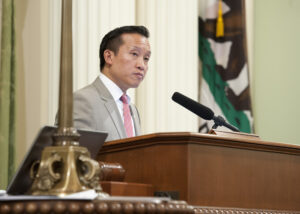The City’s brief pushes back against legal effort that could harm local economies and slow housing development
SAN FRANCISCO (December 20, 2023) — San Francisco City Attorney David Chiu announced today that San Francisco has filed an amicus brief in George Sheetz v. County of El Dorado, California with the U.S. Supreme Court explaining how local government authority to use impact fees is widespread throughout the country and critically important to funding infrastructure needed to accommodate growth and development. The brief, joined by several national organizations representing local governments from across the country, calls on the Court to affirm lower court decisions upholding the legality of legislatively imposed development impact fees, which foster a predictable and transparent development approval process and fund infrastructure needs resulting from new development.

“An adverse ruling in this case could have severe consequences for local governments and slow production of badly-needed housing,” said City Attorney Chiu. “Reasonable development impact fees are necessary to ensure we all have adequate schools, utilities, roads, transportation, parks, and open space. The ability to impose these fees legislatively creates a transparent and predictable development process. We urge the Court to adhere to long-established precedent respecting local governments’ authority.”
Background
Impact fees are one-time fees that local agencies charge in connection with the approval of a development project. These fees are used to help pay for public facilities and infrastructure necessary to support the new development. Impact fees cover a wide range of public necessities such as schools, parks, open spaces, utilities, and transportation systems.
Many local governments rely upon some form of development impact fees, and 35 states, including California, have legislation explicitly authorizing local governments to charge impact fees. Without impact fees, the costs associated with new development may otherwise fall to existing resident taxpayers who did not create the need for and will not benefit from the infrastructure intended to serve new development.
Instead of giving government agencies or officials the discretion to determine impact fees on a project-by-project basis, local governments adopt impact fees through a legislative process. Because the fees apply generally by category of development or size of a project, and without regard to the identity of the project applicant, legislatively imposed impact fees are inherently objective, transparent, and easy to administer.
In California, before passing impact fee legislation, a local government must conduct a nexus study that identifies the purpose of the fee, how the fee will be used, the reasonable relationship between the fee and the development, and the correlation between the need for the public facility and the type of development. The jurisdiction then adopts its impact fee schedule, which includes a predictable way to impose the fee to individual projects, such as a fee formula.
The legislative process gives the public notice of the proposed impact fee and provides an opportunity for public input. Additionally, impact fee legislation often gives developers a right to appeal the application of the fee to their projects through an administrative appeal process.
The amicus brief argues that legislatively imposed impact fees are critical tools for local governments to fund the necessary physical infrastructure to support new development in a transparent, predictable way. Without the ability to impose impact fees, local governments would need to resort to imposing new taxes, which would pass the costs of new development onto existing residents and businesses.
Further, requiring local jurisdictions to perform costly and time-consuming individualized nexus studies on each development project would create additional risk and uncertainty for new developments and slow the approval of desperately needed housing.
This case arises from a dispute brought by an El Dorado County homeowner, George Sheetz, over a transportation impact fee imposed on his project. Both the trial court and the California Court of Appeal, Third District, found that the impact fee was properly imposed and complied with the law. In 2022, the California Supreme Court denied review of the case, allowing the Court of Appeal’s ruling to stand. Sheetz then filed a petition for writ of certiorari, which the U.S. Supreme Court granted in September 2023.
The Local Government Legal Center, National Association of Counties, National League of Cities, International Municipal Lawyers Association, and Government Finance Officers Association joined San Francisco in the amicus brief urging the Court to uphold the legality of legislatively imposed impact fees.
The case is George Sheetz v. County of El Dorado, California, in the U.S. Supreme Court, No. 22-1074. A copy of the amicus brief can be found here.
###
